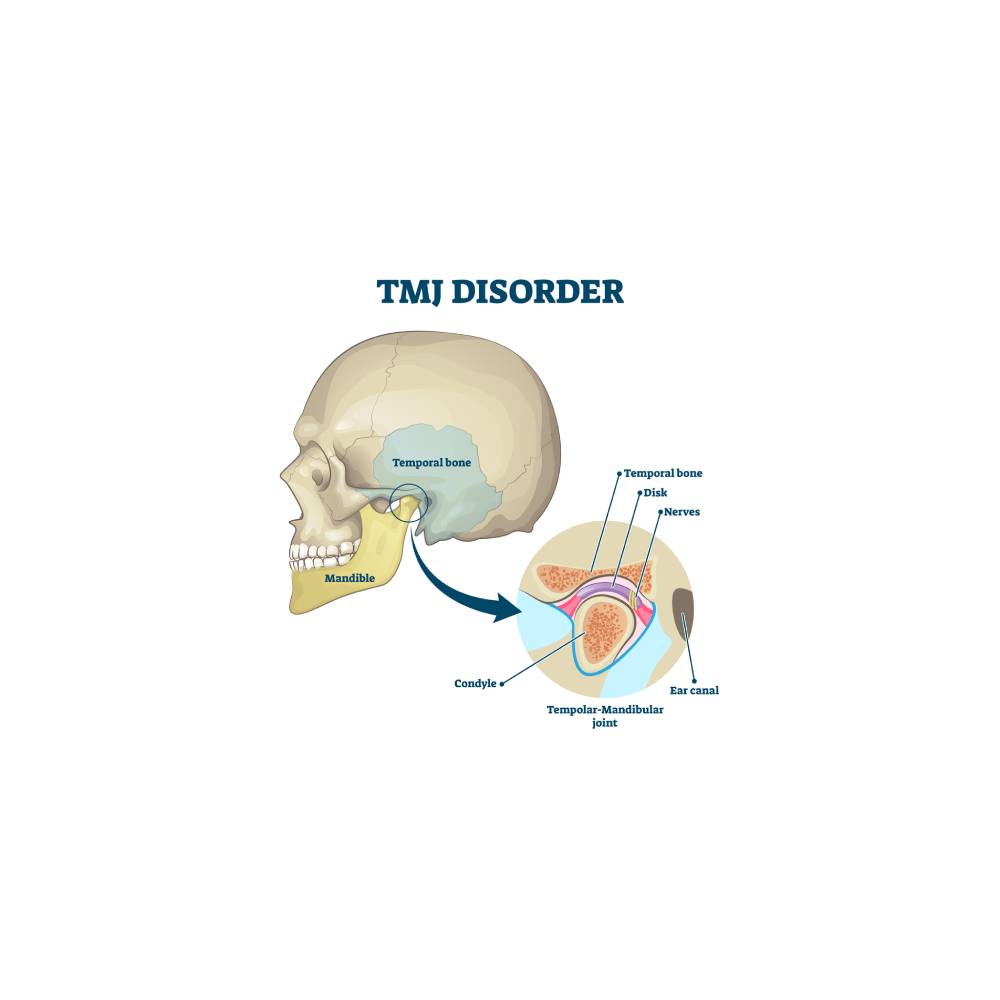TMJ Disorder
TMJ can be treated through a variety of treatment options. If you experience jaw pain, there are ways to diagnose and treat it so you can live peacefully.
TMJ Disorder
If you experience an aching jaw, pain, or tenderness in the jaw joints, or pain when chewing, you may have a Temporomandibular disorder (TMD). The most well-known TMD is Temporomandibular Joint Disorder (TMJ). The temporomandibular joint is the hinge that connects your jaw to your skull. It’s located right beneath the ears on both sides of the face.

-
How do I know if I have TMJ?
There is no way to diagnose yourself, but there are common symptoms you can look for. If you have any of these symptoms and they don’t resolve on their own, you will need to see a dentist for an official diagnosis and treatment plan.
In most cases, jaw, ear, or facial pain is temporary and resolves on its own. However, if the pain is persistent and over-the-counter medications or home remedies no longer work, give us a call.
Common signs and symptoms include:
- Pain in your jaw
- Jaw is tender to the touch
- Ear pain
- You have pain while chewing
- Facial pain that you would describe as ‘achy’
- Locking of the jaw joint — getting stuck in an open or closed position
- Headaches
-
What are the symptoms of TMJ?
TMJ is a disorder that causes a multitude of symptoms. Some symptoms of TMJ include jaw pain, tooth pain, headaches, neck and shoulder pain, and ringing of the ears.
TMJ is typically caused by one of two main reasons. The most common reason is the way the teeth come together when your mouth is closed. Our teeth have a very intricate lock and key manner in which they should come together known as occlusion. If there poorly fitting teeth it is known as malocclusion. If a malocclusion is present many of the above symptoms can result.
This can be treated in several ways based on patient preference and the severity of the malocclusion. Sometimes the teeth can be conservatively polished to fine-tune the lock and key fit. Other times orthodontics may be needed to align the teeth properly.
-
How do you treat TMJ Disorder?
In most cases, we advocate custom night guards to help protect the jaw and allow the jaw to heal. But there are a variety of options available for treating TMJ.
Oral appliances
Oral appliances can be effective in treating TMJ. At Shreveport Dental Solutions, we have both hard and soft appliances that can be worn at night. Not only do they help with TMJ, but they protect the teeth from wearing down. They also help keep other dental work safe from too much pressure which can cause cracking and breaking. Our night guards are custom fit for you. They are worn during sleep and are comfortable. If oral appliances don’t work, you may need surgical intervention. We can discuss options with you at your appointment.
Alternative pain relief options and treatments
Besides medication and oral appliances, there are other alternative options that may help relieve pain
- Avoiding foods that overwork the jaw muscles
- Applying heat and cold to the area
- Acupuncture
- Meditation or other relaxation strategies
- Massage
- Physical therapy
Beyond these treatments, there are surgical options for treating TMJ. We prefer a conservative approach to treatment first, but if you don’t find relief we can help connect you with a doctor who can examine your case and let you know if surgical intervention is appropriate.

